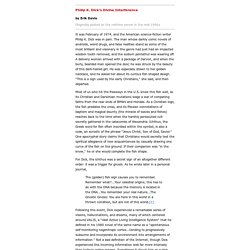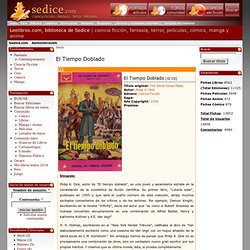

Philip K. Dick. Philip K. Dick's Divine Interference, by Erik Davis. It was February of 1974, and the American science-fiction writer Philip K.

Dick was in pain. The man whose darkly comic novels of androids, weird drugs, and false realities stand as some of the most brilliant and visionary in the genre had just had an impacted wisdom tooth removed, and the sodium pentathol was wearing off. A delivery woman arrived with a package of Darvon, and when the burly, bearded man opened the door, he was struck by the beauty of this dark-haired girl. He was especially drawn to her golden necklace, and he asked her about its curious fish-shaped design. "This is a sign used by the early Christians," she said, and then departed.
Most of us who hit the freeways in the U.S. know this fish well, as its Christian and Darwinian mutations wage a war of competing faiths from the rear ends of BMWs and Hondas. For Dick, the ichthus was a secret sign of an altogether different order: it was a trigger for gnosis. The (golden) fish sign causes you to remember. Philip K. Dick's Black Iron Subdermal Prison. , by Erik Davis: In the excepts of the Exegesis reworked into the "Tractates Crytptica Scriptura" that close the novel VALIS, Dick expresses the MIT computer scientist Edward Fredkin's view that the universe is composed of information.

The world we experience is a hologram, "a hypostasis of information" that we, as nodes in the true Mind, process. "We hypostasize information into objects. Rearrangement of objects is change in the content of information. This is the language we have lost the ability to read. " Instead, we are under the sway of the "Black Iron Prison," Dick's terms for the demiurgic worldly forces of political tyranny and oppressive social control.
Demonstrating that prisons, mental institutions, schools, and military establishments all share similar organizations of space and time, Foucault argued that a "technology of power" was distributed throughout social space, enmeshing human subjects at every turn. Prison-building with fear. Schreber y Dick: dos investigaciones. Wired 11.12: The Second Coming of Philip K. Dick. The Second Coming of Philip K.

Dick The inside-out story of how a hyper-paranoid, pulp-fiction hack conquered the movie world 20 years after his death. By Frank Rose The unbilled costar of Paycheck, the latest Hollywood thriller from the battered typewriter of Philip K. Dick, is a bullet. Paycheck, directed by John Woo and set to open Christmas Day, is the latest in a run of films based on Philip K. Dick died shortly before Blade Runner's release in 1982, and, despite a cult readership, he spent most of his life in poverty. Dick's anxious surrealism all but defines contemporary Hollywood science fiction and spills over into other kinds of movies as well. At a time when most 20th-century science fiction writers seem hopelessly dated, Dick gives us a vision of the future that captures the feel of our time.
Philip K Dick cover art. Leelibros.com, biblioteca de Sedice. Sinopsis: Philip K.

Dick, autor de "El tiempo doblado", es una joven y ascendente estrella en la constelación de la novelística de ficción científica. Su primer libro, "Lotería solar", publicado en 1955 y que será el cuarto número de esta colección, atrajo muchos excitados comentarios de los críticos y de los lectores. Por ejemplo, Damon Knigth, escribiendo en la revista "Infinity", decía del autor que "es como si Robert Sheckley se hubiese convertido abruptamente en una combinación de Alfred Bester, Henry y Katherine Kuttner y A.E. Van Vogt" Wired 11.12: The Second Coming of Philip K. Dick. Digressions on The Man Who Japed « Philip K. Dick Fan Site. By Frank C.

Bertrand Some 25 years after it was published Phil Dick said of The Man Who Japed (hereinafter MWJ), “That was my attempt to introduce humor into the science fiction novel… it does have, for the first time, my sense of humor is beginning to show up in a novel.” (In His Own Words, 1984, pp. 127-28.) In chapter 4 of MWJ, Allen Purcell explains japed to his wife, Janet, as “A term we use in packet assembly. When a theme is harped on too much you get parody. We might, at this point, start to wonder if Allen Purcell’s explanation of japed applies to MWJ itself.
One possible answer is the blatant allusion, in chapters 22 and 23 of MWJ, to Jonathan Swift’s infamous 1729 short tract, A Modest Proposal, also alluded to in Dick’s The Unteleported Man (1966). “That the remaining Hundred thousand, may, at a Year old be offered in Sale to the Persons of Quality and Fortune, through the Kingdom; always advising the Mother to let them suck plentifully in the last Month, so as to Winter.”
The Manuscripts and Papers Of Philip K. Dick « Philip K. Dick Fan Site. Special Collections Library, California State University, FullertonBowling Green State University Popular Culture Library The Philip K.

Dick materials at the Bowling Green State University Popular Culture Library, Bowling green, Ohio. August 1997. Thanks to Patrick Clark for supplying the list of items. SF Encyclopedia Picture Gallery. Philip K. Dick Bibliography · It's all about his books. Total Dick-Head.